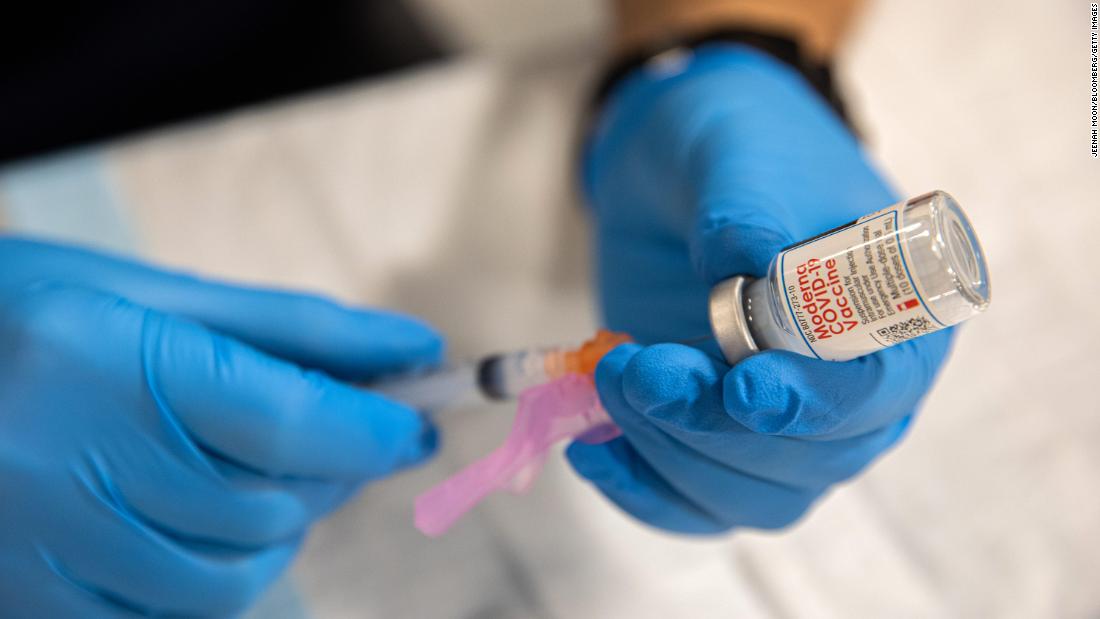
A CDC report published Friday revealed just 10 people had severe allergic reactions, known as anaphylaxis, out of more than 4 million people vaccinated with a first dose of the Moderna shot as of January 10. That's a rate of 2.5 cases per million doses administered.
The CDC previously reported that, with the Pfizer/BioNTech vaccine,11.1 people out of every million vaccinated suffered the severe allergic reaction known as anaphylaxis. To compare, the rate of severe allergic reaction for the flu vaccine is 1.3 per 1 million doses.
All 10 of the severe allergic reactions to Moderna's vaccine were in women. Symptoms began quickly -- at a median of 7 1/2 minutes after people got the shot. All the patients the CDC was able to follow up with have recovered.
Nine of the patients had a documented history of allergies and more than half of those people had a previous history of anaphylaxis. Only one had a prior allergic reaction to a vaccine. The others had allergic reactions to a mix of things -- drugs, contrast agents used in some medical imaging and one person had a food allergy.
Anaphylaxis can be life threatening but people usually recover completely if promptly treated. The US Food and Drug Administration requires all sites giving Covid-19 vaccines to have trained responders and anaphylaxis treatments at hand.
The CDC has been monitoring for adverse reactions and collected 1,266 adverse event reports related to the Moderna vaccine. Among those reports, 108 involving allergic reactions were flagged for further review. Most reports of adverse events end up being unrelated to vaccination.
The CDC determined 47 of the reports were nonanaphylaxis allergic reactions and 47 were considered nonallergic reactions. Four case reports didn't have enough information to make a determination.
"An abundance of caution"
The CDC and FDA are carefully monitoring the rollout of vaccines for any adverse events.
California health officials told medical providers to pause the administration of one lot of Moderna vaccines on Sunday, after several people at a clinic in San Diego required medical attention over 24 hours after receiving doses from the lot.
Moderna said the lot contained more than 1.2 million doses shipped to 37 different states.
California's health department recommended the pause out of an "abundance of caution." After an investigation, it gave the state the all-clear to immediately resume vaccinations on Wednesday.
CDC advice
The CDC says that people who have an immediate allergic reaction to a first dose of either the Pfizer or Moderna vaccine shouldn't get the second.
Though severe reactions are relatively rare, the CDC has asked that vaccine providers be prepared. Vaccination sites must monitor people for at least 15 minutes after they receive a shot and have trained staff and supplies on hand to manage adverse reactions.
Those with a history of allergic reactions to other types of vaccines are advised to ask their doctor before getting vaccinated against Covid-19.
Doctors say the benefits of getting vaccinated against Covid-19 outweigh the risks.
Most people with allergies or a history of severe allergic reactions not related to vaccines or injectables should get be able to safely get vaccinated, the CDC says.
Those who get vaccinated can expect some side effects, like pain or swelling at the injection site, and fever, fatigue or headaches. Doctors say these are normal signs that the body is building protection against the virus.
"severe" - Google News
January 23, 2021 at 06:48AM
https://ift.tt/3iC81Ji
Severe allergic reactions to Moderna's Covid-19 vaccine are rare, CDC says - CNN
"severe" - Google News
https://ift.tt/2OrY17E
Shoes Man Tutorial
Pos News Update
Meme Update
Korean Entertainment News
Japan News Update
Bagikan Berita Ini















0 Response to "Severe allergic reactions to Moderna's Covid-19 vaccine are rare, CDC says - CNN"
Post a Comment